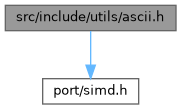Loading...
Searching...
No Matches
ascii.h File Reference
#include "port/simd.h"
Include dependency graph for ascii.h:

This graph shows which files directly or indirectly include this file:

Go to the source code of this file.
Functions | |
| void | ascii_safe_strlcpy (char *dest, const char *src, size_t destsiz) |
| static bool | is_valid_ascii (const unsigned char *s, int len) |
Function Documentation
◆ ascii_safe_strlcpy()
Definition at line 174 of file ascii.c.
175{
177 return;
178
180 {
181 /* use unsigned char here to avoid compiler warning */
183
185 break;
186 /* Keep printable ASCII characters */
189 /* White-space is also OK */
192 /* Everything else is replaced with '?' */
193 else
195 dest++;
196 }
197
199}
References fb().
Referenced by BackgroundWorkerStateChange(), and pgstat_get_crashed_backend_activity().
◆ is_valid_ascii()
Definition at line 25 of file ascii.h.
26{
30#ifdef USE_NO_SIMD
32#endif
33
35
37 {
39
40 /* Capture any zero bytes in this chunk. */
41#ifdef USE_NO_SIMD
42
43 /*
44 * First, add 0x7f to each byte. This sets the high bit in each byte,
45 * unless it was a zero. If any resulting high bits are zero, the
46 * corresponding high bits in the zero accumulator will be cleared.
47 *
48 * If none of the bytes in the chunk had the high bit set, the max
49 * value each byte can have after the addition is 0x7f + 0x7f = 0xfe,
50 * and we don't need to worry about carrying over to the next byte. If
51 * any input bytes did have the high bit set, it doesn't matter
52 * because we check for those separately.
53 */
55#else
56
57 /*
58 * Set all bits in each lane of the highbit accumulator where input
59 * bytes are zero.
60 */
63#endif
64
65 /* Capture all set bits in this chunk. */
67
69 }
70
71 /* Check if any high bits in the high bit accumulator got set. */
73 return false;
74
75#ifdef USE_NO_SIMD
76 /* Check if any high bits in the zero accumulator got cleared. */
78 return false;
79#endif
80
81 return true;
82}
References Assert, fb(), len, vector8_broadcast(), vector8_is_highbit_set(), vector8_load(), and vector8_or().
Referenced by pg_utf8_verifystr().